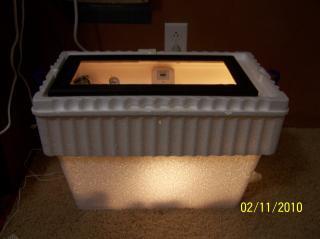I am soooooo frustrated!!!!!!!

DD and I made a homemade incubator. We didn't have a great hatch the first go round, so we have tried to work out the bugs and are trying again. This time with pretty expensive eggs!!
I have come to realize that an incubator, whether store bought or homemade, is only as good as its thermometers are accurate.
The temperatures in my first hatch were fine all the way through, but the results of my hatch indicate that the temps were too high which means my thermometers were lying to me. We only got 6 chicks out of 25 eggs. The first chick to hatch was early and didn't absorb its yolk sack completely. It died a couple of days later. Several were shrink wrapped. It just wasn't good.

This time, I have a Springfield, 3 acu-rites, and 2 liquid types, an engineer's temp reader (not sure what it is really called), and a meat thermometer which we calibrated, but I am not sure it is holding its calibration. They ALL say something different!!!
 Sometimes they are telling me that the incubator is 4 degrees hotter on one side than the other! Can that even be possible? I have a fan in there, the air should be the same! Right?
Sometimes they are telling me that the incubator is 4 degrees hotter on one side than the other! Can that even be possible? I have a fan in there, the air should be the same! Right?
Also, I have no idea if the hygrometers are correct. I did the test on one of them, but the results of my last hatch would indicate that my test didn't give me true answers.
So, what do you all do? How do you know you can trust your thermometer? I have heard that everyone throws away the thermometers that come with their bators, so what are you using?
I am really hoping to bring these poor eggs that I payed good money for to a decent hatch.

I will appreciate your advice. I set them on Tuesday. I know it takes a day or two to level out the temps, but it isn't looking good. Please help me...
Here is my bator and most of the thermometers



DD and I made a homemade incubator. We didn't have a great hatch the first go round, so we have tried to work out the bugs and are trying again. This time with pretty expensive eggs!!
I have come to realize that an incubator, whether store bought or homemade, is only as good as its thermometers are accurate.
The temperatures in my first hatch were fine all the way through, but the results of my hatch indicate that the temps were too high which means my thermometers were lying to me. We only got 6 chicks out of 25 eggs. The first chick to hatch was early and didn't absorb its yolk sack completely. It died a couple of days later. Several were shrink wrapped. It just wasn't good.

This time, I have a Springfield, 3 acu-rites, and 2 liquid types, an engineer's temp reader (not sure what it is really called), and a meat thermometer which we calibrated, but I am not sure it is holding its calibration. They ALL say something different!!!

Also, I have no idea if the hygrometers are correct. I did the test on one of them, but the results of my last hatch would indicate that my test didn't give me true answers.
So, what do you all do? How do you know you can trust your thermometer? I have heard that everyone throws away the thermometers that come with their bators, so what are you using?
I am really hoping to bring these poor eggs that I payed good money for to a decent hatch.

I will appreciate your advice. I set them on Tuesday. I know it takes a day or two to level out the temps, but it isn't looking good. Please help me...
Here is my bator and most of the thermometers




